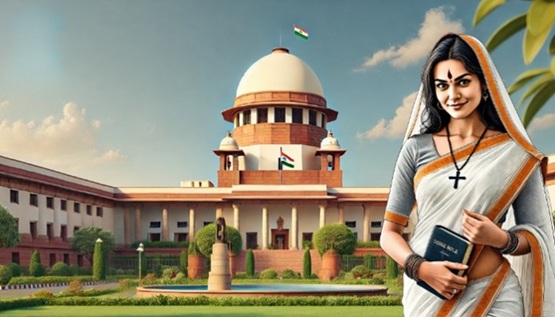| (Mains, General Studies Paper 2: Indian Constitution - Historical Underpinnings, Evolution, Features, Amendments, Significant Provisions and Basic Structure; Government Policies and Interventions for Development in Various Sectors, and Issues Arising from Their Design and Implementation) |
Context
Hearing petitions challenging anti-conversion laws enacted by several states, the Supreme Court has raised the question of who has the authority to determine whether a conversion is fraudulent.

Recent Petition
- According to the petitioner, several states (Uttar Pradesh, Madhya Pradesh, Gujarat, Uttarakhand) have laws regulating religious conversion.
- These laws are called the Freedom of Religion Act. Essentially, they are anti-conversion laws.
- Recent amendments to these laws give third parties the right to file criminal complaints against couples who enter into interfaith marriages.
- The punishment under this Act includes a minimum sentence of 20 years or a maximum sentence of life imprisonment.
- The bail conditions are similar to those under the stringent Unlawful Activities (Prevention) Act.
- The petitioner argues that only instances of religious conversion based on fraud, coercion, inducement, or marriage are mentioned. These laws impinge on Article 25 (freedom of conscience and the right to freely profess, practice, and propagate religion).
Supreme Court Observations
- The mere fact that a conversion has occurred cannot be considered fraudulent or deceptive.
- The definition of 'inducement' or 'fraud' should not be left vague.
- There is a risk of misuse against interfaith marriages and voluntary conversions.
- During the hearing of a related case in 2023, the Supreme Court refused to refer the question to the Law Commission of India on whether “forced religious conversion” should be made a separate crime under the Indian Penal Code.
Constitutional Perspectives
- Article 25: Freedom of religion subject to public order, morality, and health
- Article 21: Right to dignity, privacy, and choice
- Article 14: Equality before the law—these may be violated by arbitrary restrictions.
Concerns
- Over-criminalization of personal choice
- Burden of proof often placed on individuals or accused
- Negative impact on inter-religious harmony
Way Forward
- “Fraudulent conversion” should be clearly defined to avoid arbitrariness.
- State laws should be subject to judicial scrutiny to ensure a balance between individual rights and public order.
- Instead of criminalizing personal religious decisions, there is a need to promote awareness and dialogue.



